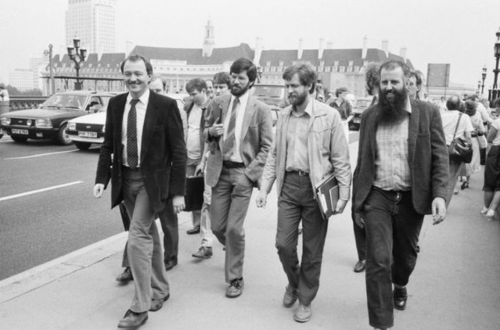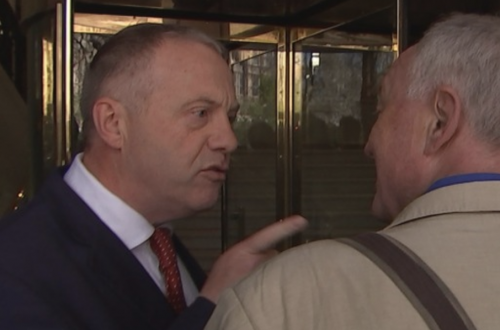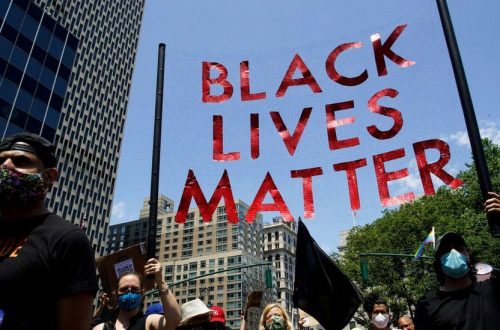Charlie Hebdo’s recent editorial – ‘How did we end up here?’ – has prompted vigorous debate. While some frame it as a piece about the dangers of accommodationism others interpret it as an attack on all Muslims as potential fifth columnists. Having seen the contrasting responses on social media I reread it in an attempt to answer this question.
After setting out some perceived factors behind the Brussels attacks the editorial explains:
In reality, the attacks are merely the visible part of a very large iceberg indeed. They are the last phase of a process of cowing and silencing long in motion and on the widest possible scale.
As I reread that little section I was trying to work out whether this ‘iceberg’ was something being done to us (‘fifth column’ reading), or something we were doing to ourselves (accommodationist reading). The phrase ‘cowing and silencing’ was a little ambiguous with regard to agency so I decided to look at the French. Interestingly the striking phrase ‘a process of cowing and silencing’ seemed to have no equivalent in the original editorial.
À vous de choisir. En réalité, les attentats sont la partie émergée d’un gros iceberg. Ils sont la dernière phase d’un processus enclenché depuis longtemps et à grande échelle.
Had it been given a more counterjihadist gloss in translation? (Unfortunately only the opening paragraphs of the French version are available online – I tried to buy the article but kept on getting an error message.)
The focus then turned to Tariq Ramadan. Ramadan is presented as a smooth apologist with a particular role to play in softening up secularist society to accept some degree of Islamisation.
He puts himself forward as a man of dialogue, someone open to a debate. A debate about secularism which, according to him, needs to adapt itself to the new place taken by religion in Western democracy. A secularism and a democracy which must also accept those traditions imported by minority communities. Nothing bad in that. Tariq Ramadan is never going to grab a Kalashnikov with which to shoot journalists at an editorial meeting. Nor will he ever cook up a bomb to be used in an airport concourse. Others will be doing all that kind of stuff. It will not be his role. His task, under cover of debate, is to dissuade people from criticising his religion in any way. The political science students who listened to him last week will, once they have become journalists or local officials, not even dare to write nor say anything negative about Islam. The little dent in their secularism made that day will bear fruit in a fear of criticising lest they appear Islamophobic. That is Tariq Ramadan’s task.
The words in bold clearly don’t reflect the writer’s real views. They are – or certainly turn out to be – ironic. I don’t have a problem with this part of the article. However the pattern of rhetoric here – ironic praise which is then undercut – colours what comes next: three portraits of different Muslim types.
Take this veiled woman. She is an admirable woman. She is courageous and dignified, devoted to her family and her children. Why bother her? She harms no one. Even those women who wear the total, all-encompassing veil do not generally use their clothing to hide bombs (as certain people were claiming when the law to ban the burqa was being discussed). They too will do nothing wrong. So why go on whining about the wearing of the veil and pointing the finger of blame at these women? We should shut up, look elsewhere and move past all the street-insults and rumpus. The role of these women, even if they are unaware of it, does not go beyond this.
Does the writer really think the veiled woman (and at first use the phrase only signifies a hijabi woman) is admirable? Or are the positive statements as barbed as ‘a man of dialogue’? It’s possible to make firm, reasoned criticisms of all aspects of hijab (not just face coverings) from a secularist or feminist perspective. But the editorial seems to be going further and encouraging the reader to distrust individual hijabi women by inviting, at least, an ironic reading of the opening praise.
The next paragraph begins with the same formula. If the reader was left vaguely wondering if the hijabi woman was quite as nice as she seemed, the more sharply individualised halal baker will probably compound that effect. Again apparent sentences of praise are swiftly undercut.
Take the local baker, who has just bought the nearby bakery and replaced the old, recently-retired guy, he makes good croissants. He’s likeable and always has a ready smile for all his customers. He’s completely integrated into the neighbourhood already. Neither his long beard nor the little prayer-bruise on his forehead (indicative of his great piety) bother his clientele. They are too busy lapping up his lunchtime sandwiches. Those he sells are fabulous, though from now on there’s no more ham nor bacon. Which is no big deal because there are plenty of other options on offer – tuna, chicken and all the trimmings. So, it would be silly to grumble or kick up a fuss in that much-loved boulangerie.
We are surely being invited to sneer at the clients who aren’t that bothered about the change of ownership and will just go to another shop if they want a ham baguette – and nudged to take a bit more notice of that prayer-bruise than the people who are perhaps ‘lapping up’ (interesting idiom) more than his food. Just how integrated is the seemingly jovial baker? Those of us who think this is essentially an issue of market forces are, the editorial implies, dupes. It goes on:
We’ll get used to it easily enough. As Tariq Ramadan helpfully instructs us, we’ll adapt. And thus the baker’s role is done.
Does the baker know what he’s doing? We aren’t told for sure.
The next paragraph again invites us to ‘take’ someone – this time a terrorist, the tip of the iceberg.
Take this young delinquent. H has never looked at the Quran in his life, he knows little of the history of religion, of colonialism, nor a great deal about the proud country of his Maghreb forefathers. This lad and a couple of his buddies order a taxi. They are not erudite like Tariq Ramadan, they don’t pray as often as the local baker and are not as observant as the redoubtable veiled mothers on the street. The taxi heads for Brussels airport. And still, in this precise moment, no one has done anything wrong. Not Tariq Ramadan, nor the ladies in burqas, not the baker and not even these idle young scamps.
Here the rhetoric joins together everyone we’ve met so far, united in not having done anything wrong – yet. Given how very technical this innocence is in the case of the terrorist, the reader’s suspicions that the baker and the veiled women are all in on some kind of plot may seem confirmed.
The editorial goes on to blame us – this element fits in with the view that this is a piece is about accommodationism.
And yet, none of what is about to happen in the airport or metro of Brussels can really happen without everyone’s contribution.
Yet, although we (non-Muslims) are all at fault, we appear to be implicated in a different way from the Muslims, who still seem to be part of a Muslim continuum in which all (or a lot of) Muslims are playing their part albeit in very different ways.
These young terrorists have no need to amass the talents of others, to be erudite, dignified or hard-working. Their role is simply to provide the end of a philosophical line already begun. A line which tells us “Hold your tongues, living or dead. Give up discussing, debating, contradicting or contesting”.
The injunction in quotation marks emphasises the sense that the problem is all about what Muslims are doing to us. The editorial could have added paragraphs on, for example, nurseries banning pork products, newspapers refusing to show images of Mohammed, the covering up of nude statues when a Muslim dignitary visits. That would have made it clearer that the article was a critique of accommodationism.
This is the conclusion:
The first task of the guilty is to blame the innocent. It’s an almost perfect inversion of culpability. From the bakery that forbids you to eat what you like, to the woman who forbids you to admit that you are troubled by her veil, we are submerged in guilt for permitting ourselves such thoughts. And that is where and when fear has started its sapping, undermining work. And the way is marked for all that will follow.
Halal bakeries don’t really ‘forbid’ us from eating pork any more than vegetarian restaurants do and women wearing hijab will have a whole range of views about the issue and very likely have no wish to censor critical perspectives though they may not welcome being challenged on the street about the way they dress. Why not target some named defender of the veil, rather than this Muslim everywoman?
So – is the iceberg our fear or the threat of Islamism? I think it’s possible to make a case both ways, but for me the emphasis is on the Islamist threat. Yes, it’s partly about non-Muslim cowardice or queasiness – but it vividly sketches a force emanating from the Muslims, a force which is slightly ambiguous in terms of intention or agency – and perhaps all the more sinister for that.
Update I was looking again at the possibilities I started out with and thought I should make clear that I don’t think this is ‘an attack on all Muslims as potential fifth columnists’. Some have been saying it as good as paints all Muslims as terrorists and that’s clearly not the case. However another interesting feature of the editorial is the fact that it doesn’t directly assert that the third generic Muslim, the ‘young delinquent’, is a terrorist. He’s just a rather ignorant ‘lad’, not particularly religious, who happens to be going to Brussels airport with his mates. But the fact that we are drawn to fill in the gaps here – extrapolate what he really is – could be seen as reinforcing any vague sense we’d picked up that the other two generic Muslims shouldn’t be trusted either, even though – as with the lad – we are given no concrete evidence for our suspicions.



